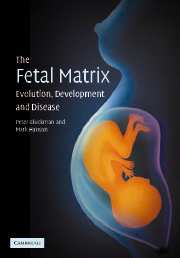Book contents
- Frontmatter
- Contents
- Preface
- 1 Shaping our destiny: genes, environment and their interactions
- 2 Mother and fetus
- 3 Fetal choices
- 4 Predictive adaptive responses and human disease
- 5 Obesity, diabetes and other diseases
- 6 The biology of predictive adaptive responses
- 7 Predictive adaptive responses – critical processes in evolution
- 8 Evolutionary echoes and the human camel
- 9 Improving human health
- 10 Fetal futures
- Further reading and references
- Index
1 - Shaping our destiny: genes, environment and their interactions
Published online by Cambridge University Press: 05 November 2011
- Frontmatter
- Contents
- Preface
- 1 Shaping our destiny: genes, environment and their interactions
- 2 Mother and fetus
- 3 Fetal choices
- 4 Predictive adaptive responses and human disease
- 5 Obesity, diabetes and other diseases
- 6 The biology of predictive adaptive responses
- 7 Predictive adaptive responses – critical processes in evolution
- 8 Evolutionary echoes and the human camel
- 9 Improving human health
- 10 Fetal futures
- Further reading and references
- Index
Summary
This book is about a set of biological responses we have termed predictive adaptive responses, and their implications for understanding evolutionary processes, health and disease. These concepts flow from our more recent insights into one of the oldest debates in biological science.
Since the time of Hippocrates, there has been discussion about which characteristics are primarily genetic in origin, and thus immutable, and those characteristics that are plastic in nature, and thus can be influenced by the environment. The impact of modern molecular, genomic and developmental biology on our capacity to understand and address the issues that arise from this big question has been enormous – it is that explosion of biological understanding in the last 30 years that underpins this book. But as we have eradicated many causes of premature death, at least in the developed world, we have become much more conscious of the ongoing impact of environmental influences. In the enthusiasm for modern genetics, this has been much less studied. Yet it is critical we understand that it is the interaction between our environment and our genes that determines our destiny. It is now naïve to think about genes (nature) and environment (nurture) in a dichotomous way. We now comprehend that the manner in which the environment affects gene expression on one hand, and how genetic variation affects the response to the environment on the other, is the basis of biological destiny.
- Type
- Chapter
- Information
- The Fetal Matrix: Evolution, Development and Disease , pp. 1 - 24Publisher: Cambridge University PressPrint publication year: 2004



